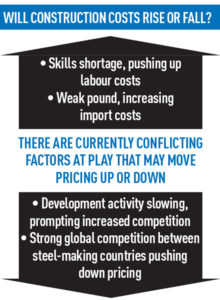The construction industry is in recession and with the sister sector of the property industry struggling, there are concerns that problems might start running through the family.

In the second quarter construction shrank by 0.7%, which followed an even bigger dip at the start of the year of 1.1%, according to the Office of National Statistics.
Some construction companies have already fallen into administration this year and if more follow, developers are set to lose out through potential delays and retendered contracts potentially being more expensive. As a result, there is an increased need for developers and contractors to work more closely together.
“Unfortunately, it is likely there will be more administrations. Often it is not because companies are not successful but because they have a lack of cash and clients and their own contractors are not supporting them,” said Gareth Lewis, chief operating officer for construction at Mace, one of the UK’s 10 largest construction companies.
Development activity has slowed due to decisions being put off in the run up to the EU referendum and the subsequent drop in confidence in the economy caused by the result.
“We are seeing a slowdown in pipeline, a pause and a reflective period. We have only seen one of 93 projects put on hold though, which is less than I had anticipated,” Lewis added.
Despite the difficult conditions the construction industry is enduring, there may be less distress in this cycle than after the global financial crisis in 2008. When development hit a post-crash nadir some contractors agreed jobs at wafer-thin margins that resulted in them getting into financial difficulties.
 Chris Temple, engineering and construction leader at PwC, said: “It is possible there will be more administrations, but many of the weaker players have already been shaken out of the sector and as a result I think the firms left think more strategically about how to weather a storm.”
Chris Temple, engineering and construction leader at PwC, said: “It is possible there will be more administrations, but many of the weaker players have already been shaken out of the sector and as a result I think the firms left think more strategically about how to weather a storm.”
The picture for the construction sector is not entirely bleak. Balfour Beatty, the largest UK company in the sector, announced this week that it would pay a dividend for the first time in four years and that its UK order book had grown by 11% to £2.1bn, although it still reported a pretax loss of £21m.
Anthony Codling, managing director and analyst at Jefferies, said: “For the large companies, things seem to be getting better and they have more spring in their step than any time since 2009. Developers should look to go with contractors with a track record and cash on their balance sheet that are unlikely to go bust.
“Smaller construction companies looking to compete for work sometimes cannot manage their growth, particularly if they are quoting unrealistic fixed prices for projects.”
Reasons to be fearful: what’s gone wrong in construction
• Dunne Group, HOC (UK) and PHD1 have all entered administration in the past four months
• Laing O’Rourke had to agree new bank facilities in April due to “problem contracts”
• Sir Robert McAlpine reported a pretax loss of £52.2m in May due to unprofitable “legacy contracts”
• Decisions on major infrastructure projects such as Hinkley Point, HS2 and the expansion of Heathrow delayed
 What to do if your contractor goes bust
What to do if your contractor goes bust
Mark Farmer, chief executive of Cast, advises
If there is an insolvency, then the impact on the developer in terms of direct administrative requirements depends on whether it is a main contractor or subcontractor which has failed.
If it is the main contractor, it is crucial that the client’s contract administrator and quantity surveyor apply the appropriate contractual mechanisms and the developer begins dialogue with the appointed insolvency practitioner.
Practical implications include valuing the works completed, securing the completed works and any materials on site, ensuring all off-site materials are set aside and getting to grips with monies owed between the parties, including retention funds.
Checklist: how to prevent financial problems with your contractor
Darren Boyaram, director in cost management at JLL, advises
• Carry out rigorous financial and order book checks
• Secure access to sub-contractor financial data
• Gain bonds and guarantees from parent company
• Undertake two-stage procurement to influence the supply chain
• Resist advance payment provisions
• Scrutinise payment for off-site materials
• Keep your ears open in the market
• To send feedback, email david.hatcher@estatesgazette.com or tweet @hatcherdavid or @estatesgazette











